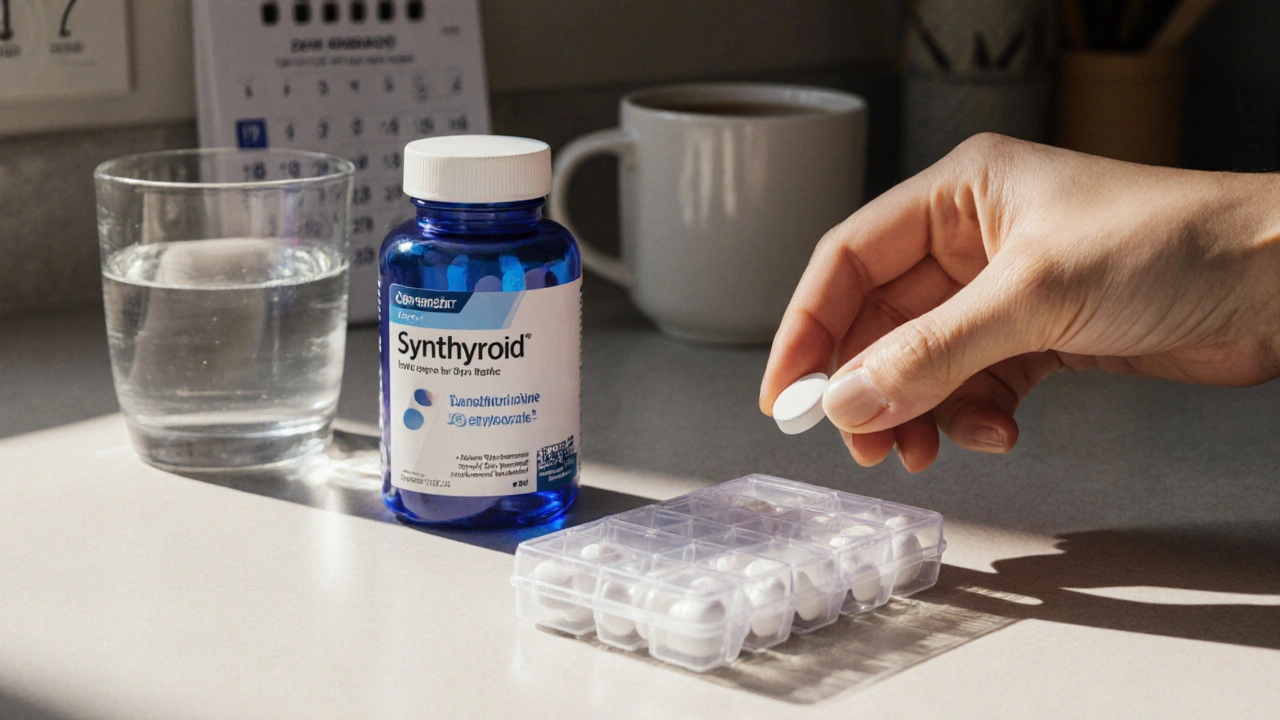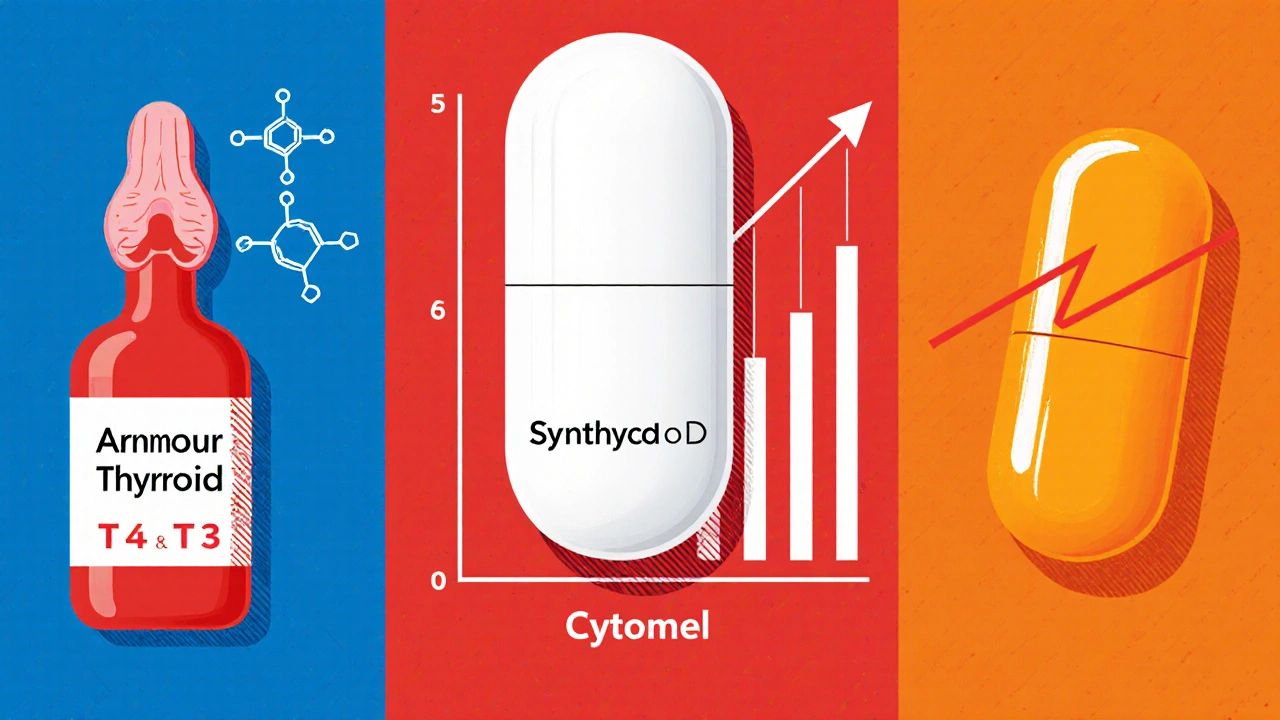Synthroid (Levothyroxine) vs. Alternative Thyroid Medications: In‑Depth Comparison

Thyroid Medication Assessment Tool
This tool helps you evaluate your situation based on the article's key factors. It's not a replacement for medical advice - please discuss results with your healthcare provider.
Your Assessment
Your Personalized Assessment
This assessment is for informational purposes only. Your healthcare provider should always be involved in treatment decisions.
Key Takeaways
- Synthroid is a synthetic T4 tablet; generic levothyroxine offers the same hormone at a lower price.
- Desiccated thyroid (e.g., Armour) provides both T4 and T3, which some patients prefer for symptom relief.
- Liothyronine (Cytomel) is pure T3, useful in combination therapy but requires careful monitoring.
- Cost, dosing flexibility, and individual response are the main factors when choosing a replacement.
- Regular thyroid function tests (TSH, free T4, free T3) guide dose adjustments for any therapy.
Why the Comparison Matters
People diagnosed with hypothyroidism often start on a Synthroid alternatives plan without knowing what else is out there. While Synthroid (levothyroxine) dominates the market, many patients report persistent fatigue, weight gain, or brain‑fog despite "normal" lab results. Understanding how other options work helps you and your clinician decide whether a switch could improve quality of life.
What Is Hypothyroidism?
Hypothyroidism is a condition where the thyroid gland does not produce enough hormones, primarily thyroxine (T4) and, to a lesser extent, triiodothyronine (T3). The deficit slows metabolism, leading to symptoms such as cold intolerance, dry skin, constipation, and sluggish mental function. Diagnosis relies on blood tests-mainly thyroid‑stimulating hormone (TSH) and free T4 levels.
Synthroid: The Standard Synthetic T4
When treating hypothyroidism, Synthroid is a brand name of levothyroxine, a synthetic form of the thyroid hormone T4. It comes in tablets ranging from 25µg to 200µg, allowing precise dosing. Most guidelines recommend starting with a low dose (e.g., 25‑50µg) for older patients or those with heart disease, then titrating every 4‑6 weeks based on TSH.
Pros: predictable absorption, extensive safety data, covered by most insurance plans.
Cons: strict timing (take on an empty stomach, avoid calcium/iron for 4hours), some patients feel residual symptoms despite normal labs.
Generic Levothyroxine: Same Hormone, Lower Cost
Levothyroxine is the generic counterpart to Synthroid. In the UK and many EU markets, the medication is sold under various brand‑names (e.g., Eltroxin, Tirosint). The active ingredient is identical, but tablets may differ in filler composition, potentially influencing absorption for a small subset of patients.
Pros: cost‑effective, widely available, interchangeable with most clinicians' prescribing software.
Cons: some patients report slight variations in TSH stability when switching manufacturers; always check labs after a change.

Armour Thyroid: Desiccated Natural Hormone
Armour Thyroid is a desiccated thyroid extract derived from porcine thyroid glands. It contains a fixed ratio of T4 to T3 (approximately 4:1), mimicking the natural hormone mix released by a healthy human thyroid.
Pros: provides both T4 and T3, which may relieve symptoms that pure T4 cannot; some patients report better mood and energy.
Cons: hormone content can vary batch‑to‑batch; dosage increments are larger (typically 15‑60mg), limiting fine‑tuning; not always covered by insurance.
Liothyronine (Cytomel): Pure T3 Therapy
Liothyronine, sold as Cytomel, delivers synthetic triiodothyronine (T3) directly. Because T3 is the active form that enters cells quickly, it can correct symptoms faster than T4 alone.
Pros: rapid symptom relief, useful for patients with conversion issues (T4 → T3) or persistent brain‑fog.
Cons: short half‑life (≈1day) leads to peaks and troughs; requires multiple daily doses; higher risk of cardiac side effects; careful TSH and free T3 monitoring is mandatory.
Combination Therapy: T4 + T3
Many endocrinologists now prescribe a mix of levothyroxine (T4) plus a small amount of liothyronine (T3). The typical ratio is 10‑20µg of T3 per 100‑150µg of T4. This approach aims to preserve the stability of T4 while adding the metabolic boost of T3.
Studies from 2023‑2024 suggest that about 10‑15% of patients benefit from combination therapy, especially those with persistent fatigue despite normal TSH.
Other Options Worth Mentioning
- Compounded thyroid preparations: custom‑dose capsules that blend T4 and T3 in any ratio; useful for patients intolerant to fillers.
- Natural desiccated tablets (e.g., Nature-Throid): similar to Armour but produced in the US with stricter batch testing.
- Thyroid hormone‑free supplements: iodine, selenium, and zinc can support hormone synthesis but cannot replace prescription therapy.
Side‑by‑Side Comparison
| Medication | Active Hormone(s) | Formulation | Typical Dose Range | Cost (UK) | Pros | Cons |
|---|---|---|---|---|---|---|
| Synthroid | T4 (levothyroxine) | tablet | 25‑200µg | £5‑£12 per month | consistent absorption, insurance covered | no T3, strict timing |
| Levothyroxine (generic) | T4 | tablet, capsule, liquid | 25‑200µg | £2‑£6 per month | cheaper, multiple brands | possible batch variation |
| Armour Thyroid | T4 & T3 (desiccated) | tablet | 15‑120mg (≈60‑240µg T4) | £15‑£25 per month | provides natural T3 | batch variability, larger dose steps |
| Cytomel (Liothyronine) | T3 | tablet | 5‑25µg daily | £12‑£20 per month | fast symptom relief | short half‑life, cardiac risk |
| Combination (T4+T3) | Both | tablet + capsule or compounded | 100‑150µg T4 + 5‑10µg T3 | £10‑£18 per month | balances stability & metabolism | requires two prescriptions, monitoring |

How to Choose the Right Medication
Pick a therapy based on three practical criteria:
- Clinical response: Do you still feel fatigued or cold despite a normal TSH? If yes, consider adding T3 or switching to desiccated thyroid.
- Cost & access: Generic levothyroxine is the most affordable; insurance may restrict coverage for Armour or Cytomel.
- Safety profile: Patients with heart disease, atrial fibrillation, or osteoporosis should stay on pure T4 unless closely supervised.
Discuss these points with your GP or endocrinologist. A trial period of 6‑8 weeks after any change gives the body enough time to settle, after which repeat TSH, free T4, and free T3 tests guide further tweaks.
Monitoring and Dose Adjustments
Regardless of the medication, regular lab work is essential. Typical monitoring schedule:
- Baseline: TSH, free T4, free T3, lipid panel.
- First follow‑up (4‑6 weeks after starting or changing dose): TSH.
- Subsequent checks (every 6‑12 months): TSH + free T4; add free T3 if you’re on T3‑containing therapy.
Target TSH ranges differ slightly between guidelines, but most aim for 0.5‑4.5mIU/L. For combination therapy, also keep free T3 in the upper‑normal range (3.5‑5.5pg/mL) to avoid excess.
Potential Pitfalls to Avoid
- Skipping the empty‑stomach rule: Calcium, iron, soy, and certain fibre supplements can cut levothyroxine absorption by up to 40%.
- Self‑adjusting doses: Even a 12.5µg change can swing TSH dramatically; always adjust under medical supervision.
- Relying solely on TSH: Some patients have normal TSH but low free T3; combination therapy can help in those cases.
- Ignoring drug interactions: Antidepressants, beta‑blockers, and certain cholesterol meds may affect thyroid hormone metabolism.
Frequently Asked Questions
Is it safe to switch from Synthroid to a generic levothyroxine?
Yes, for most patients the switch is safe because the active ingredient is identical. However, a few individuals notice subtle changes in TSH due to different fillers. Schedule a TSH test 4‑6 weeks after the switch to confirm stability.
Why do some doctors prescribe Armour Thyroid instead of Synthroid?
Armour provides both T4 and T3. Patients who convert T4 to T3 poorly may feel better on desiccated thyroid. The decision usually follows a trial of pure T4 that leaves lingering symptoms despite a normal TSH.
Can I take both Synthroid and Cytomel together?
Yes, that’s called combination therapy. The typical regimen adds 5‑10µg of Cytomel to a stable dose of Synthroid. Because Cytomel’s effect peaks quickly, it’s usually taken in the morning, while Synthroid is taken on an empty stomach at bedtime.
What if my TSH is normal but I still feel unwell?
Consider checking free T3 and reverse‑T3 levels. Some clinicians add a low dose of liothyronine or switch to a desiccated product to address tissue‑level deficiency.
How often should I have my thyroid labs checked?
After a dose change, test TSH in 4‑6 weeks. Once stable, annual monitoring is enough for most adults, unless you have pregnancy, cardiovascular disease, or are on combination therapy, which may need semi‑annual checks.
Bottom Line
There’s no one‑size‑fits‑all answer. Synthroid (levothyroxine) remains the go‑to drug for most people because it’s cheap, safe, and well‑studied. Yet a meaningful minority benefit from added T3-whether via Armour, Cytomel, or a customized T4/T3 mix. The key is a partnership with your clinician, regular lab work, and a willingness to fine‑tune the regimen until you feel truly balanced.
10 Comments
Naresh Sehgal
Listen up, if you’re still stuck on Synthroid without testing T3 levels you’re basically running on autopilot! The article nails the fact that a one‑size‑fits‑all approach just doesn’t cut it for the 10‑15% who stay fatigued. Drop the myth that “normal TSH = perfect thyroid” and push for a proper combo trial.
Johnny VonGriz
I appreciate the thorough breakdown of each thyroid option; the side‑by‑side table is especially helpful. It’s clear that generic levothyroxine saves money without sacrificing efficacy for most patients. For those who still feel sluggish, the recommendation to test free T3 makes sense. The reminder about strict timing with T4 tablets could prevent many dosing errors. Overall, a solid guide for anyone navigating their treatment plan.
Real Strategy PR
The article overlooks the long‑term cardiovascular risks of unsupervised T3 addition.
Doug Clayton
There’s a lot to unpack when you’re comparing thyroid meds. First the basics: Synthroid is pure T4 and works for the majority. It’s cheap and has a predictable absorption curve. The downside is you have to take it on an empty stomach and avoid calcium. Some patients still complain of brain fog even with normal TSH. That’s where T3 comes into play. Adding a low dose of Cytomel can give you that extra metabolic kick. Desiccated thyroid like Armour supplies both T4 and T3 in a natural ratio. The flip side is batch variability and bigger dose increments. Combination therapy lets you fine‑tune both hormones without the big jumps. You’ll need two prescriptions and more lab work but the payoff can be worth it. Regular monitoring of TSH, free T4 and free T3 is essential regardless of the regimen. Cost is another factor – generic levothyroxine is the most affordable option. Insurance often covers Synthroid but may balk at Armour or Cytomel. In the end the best choice is the one that makes you feel energized while keeping labs in range.
Michelle Zhao
While the comparative table is exhaustive, one must question the implicit endorsement of combination therapy without acknowledging the paucity of long‑term randomized trials. The literature still wrestles with whether the modest symptomatic gains outweigh potential arrhythmic hazards, especially in geriatric cohorts. Moreover, the authors gloss over the regulatory inconsistencies that plague desiccated extracts across jurisdictions. A prudent clinician would weigh these uncertainties before deviating from the well‑established levothyroxine monotherapy.
Jenae Bauer
Sure, but have you considered that pharma pushes cheap T4 to keep you dependent while the “real cure” is deliberately hidden?
vijay sainath
Honestly the article’s tone is way too rosy about Synthroid – it skips over the real absorption issues many of us face in India where diet and supplement interactions wreck the dose.
Daisy canales
Oh great, another genius guide that tells us to “talk to your doctor” while tossing a pricey brand name in the mix like it’s a fashion accessory.
keyul prajapati
Reading the previous comment made me think about how often we, as patients, are presented with a deluge of information that feels both overwhelming and under‑whelming at the same time. On one hand, the article does a commendable job laying out the pros and cons in a clear table, which is something many medical write‑ups neglect. On the other hand, the recurring reminder to consult a clinician can be interpreted as a safe‑guard or as a way to sidestep responsibility for the nuanced decisions patients must make. The balance between providing actionable guidance and deferring to professional judgment is a delicate one, and it seems the authors opted for the latter, perhaps out of caution. Nevertheless, for those of us who have already navigated the labyrinth of T4 versus T3 debates, the piece offers a useful recap without venturing into groundbreaking territory. Ultimately, the value lies in its ability to serve as a reference point rather than a prescriptive roadmap.
Alice L
It is heartening to observe such a comprehensive exposition concerning thyroid pharmacotherapy, particularly as it acknowledges both Western synthetic agents and traditional desiccated preparations. The nuanced discussion of cost implications alongside clinical efficacy reflects a sensitivity to the diverse socioeconomic landscapes encountered globally. By emphasizing regular laboratory monitoring, the authors reinforce a prudent standard of care that aligns with international endocrine guidelines. This balanced approach will undoubtedly serve as an informative resource for clinicians and patients alike, irrespective of cultural background.

Write a comment